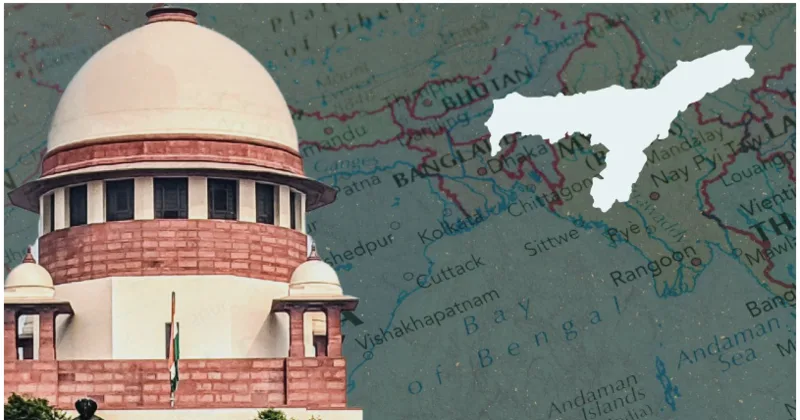
Guwahati: On October 17, the Supreme Court of India affirmed the constitutionality of Section 6(A) of the Citizenship Act, ruling that the 25th of March 1971 will continue to be the base year for identifying and expelling illegal migrants in Assam. In a landmark decision, the Indian Supreme Court ruled 4:1 in favour of upholding Section 6A of the Citizenship Act’s constitutionality. Chief Justice of India (CJI) DY Chandrachud presided over a five-judge Constitution Bench that rendered the decision.
In particular, Section 6A permits Bangladeshi immigrants who arrived in Assam between January 1, 1966, and March 25, 1971, to register as Indian citizens. Those who arrive after this deadline are not eligible to become citizens. The Chief Justice and the Supreme Court bench, however, provided more details on the reasoning for the decision, highlighting the special circumstances in Assam and stating that “The magnitude of influx into Assam and its effect on culture is higher in the state,” according to CJI Chandrachud.
“The impact of 40 lakh migrants in Assam is greater than 57 lakh in West Bengal due to the smaller land area in Assam.” He emphasised that the March 25, 1971, deadline was suitable, pointing out that the number of people moving from East Pakistan into Assam was substantial in comparison to the whole number of people moving to India after independence. In their ruling, Justices Surya Kant, Sundresh, and Manoj Misra rejected the petitioners’ argument that Section 6A went against the fraternity ideal stated in the Constitution’s Preamble.
The ability to select one’s neighbours is not a limited interpretation of brotherhood, he stressed. Justice Kant further dismissed the claim that the cut-off date indicated “manifest arbitrariness” in the provision. In response to the petitioners’ worries about Article 29, he pointed out that they had not shown that immigration had a negative impact on Assamese culture and language.
He also emphasised the requirement in Section 6A to detain and deport individuals who came beyond the deadline. According to Justice Kant’s explanation of the findings pertaining to Section 6A, immigrants who arrived in Assam before January 1, 1966, are considered Indian citizens. If they fulfil the requirements, everyone who came between January 1, 1966, and March 25, 1971, is eligible to apply for Indian citizenship.
Immigrants who arrived in Assam on or after March 25, 1971, on the other hand, are considered illegal immigrants and are subject to identification, arrest, and expulsion. The Court ordered the Ministry of Home Affairs to present information during the hearing regarding the number of illegal migrants who arrived in Assam and the Northeastern states after Bangladesh declared its independence on March 25, 1971. Additionally, the Ministry was instructed to provide data-based disclosures under a number of headings, such as the citizenship granted to immigrants over time and the functioning of the created Foreigners Tribunals.
The History and Development of the Case Citing Section 6A’s discriminatory nature, the civil society group “Assam Sanmilita Mahasangha” initially filed an affidavit in the supreme court of India in 2012. The different deadlines for regularising illegal migrants in Assam and the rest of India, they said, were unfair. The case was sent to a Constitution Bench, which was created on April 19, 2017, by a two-judge bench in 2014.
The current composition of the bench is the result of multiple reconstitutions brought about by retirements. The verdict was postponed to today, and the case hearings began on December 5 and ended on December 12, 2023..










